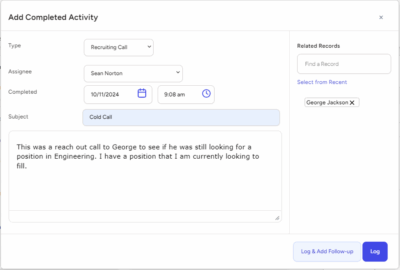Recruitment is an intricate process that involves the delicate balance of aligning the needs of employers with the aspirations and capabilities of potential candidates. Within this landscape, agency recruiters and search consultants serve as pivotal conduits. They bridge the gap between employers and job seekers. This is what makes recruitment relationships so important.
With that in mind, amidst the hustle and bustle of talent acquisition, the ethical dimensions of recruiting are often overlooked or undervalued. Yet, ethical conduct lies at the core of establishing and maintaining trust in recruitment relationships.
This blog post will explore the multifaceted ethical challenges encountered by agency recruiters and search consultants. Specifically, it will offer in-depth strategies for upholding trust and integrity throughout the recruitment journey.
Understanding Ethical Challenges in Recruitment Relationships
Recruitment professionals encounter multiple ethical dilemmas stemming from the complexity of their roles and responsibilities. The intricate interplay between the interests of candidates, clients, and the recruiting agency itself can give rise to ethical quandaries that require careful navigation.
To effectively address these challenges, it is crucial to explore the nuances of each ethical dilemma. So . . . let’s do it!
Conflicts of Interest
At the heart of many ethical dilemmas in recruitment lies the issue of conflicts of interest. Recruiters often find themselves torn between the obligations to their clients and the best interests of the candidates they represent.
For instance, a recruiter may face pressure to prioritize the demands of a high-paying client over the career aspirations of a highly qualified candidate. Negotiating these conflicts of interest while maintaining trust and integrity is a delicate balancing act.
Transparency and Honesty
Transparency is the cornerstone of trust in any relationship, including those between recruiters, candidates, and clients. However, recruiters may encounter situations where transparency conflicts with the imperative to attract candidates or secure clients.
For example, embellishing job descriptions or downplaying potential challenges in the workplace to entice candidates may compromise honesty and lead to disillusionment down the line.
Confidentiality
Recruitment involves handling sensitive information about candidates’ career trajectories, aspirations, and personal circumstances. This also extends to confidential details about clients’ hiring needs and strategies.
Maintaining the confidentiality of this information is critical to preserving trust and encouraging open communication. Breaches of confidentiality can have far-reaching consequences, damaging recruitment relationships and reputations irreparably.
Fair Treatment
Discrimination in recruitment based on race, gender, age, or other factors not only violates ethical principles, but it also contravenes legal regulations. Recruiters must ensure that all candidates receive fair and equal treatment throughout the recruitment process, from application to placement.
Failure to do so undermines trust and also perpetuates systemic inequalities within the workforce.
Candidate Representation
Recruiters serve as advocates for candidates, presenting their qualifications, skills, and experiences in the best possible light to potential employers. However, misrepresenting or exaggerating a candidate’s credentials can lead to disillusionment and mistrust.
It is essential for recruiters to provide an accurate and honest assessment of each candidate’s strengths and limitations for the sake of trust and credibility.
Recruitment Relationships: How to Uphold Trust
Effectively navigating ethical challenges in recruitment requires a proactive and principled approach. By implementing a comprehensive set of strategies, recruiters can uphold trust and integrity in their relationships with candidates and clients alike.
Let’s take a look at some of these strategies!
Prioritize Integrity
Integrity should serve as the guiding principle in every aspect of recruitment. Recruiters must act with honesty, transparency, and fairness in all their interactions, even when faced with difficult decisions or competing interests.
By prioritizing integrity above all else, recruiters can build lasting recruitment relationships based upon trust and mutual respect.
Establish Clear Policies
Clear and comprehensive ethical guidelines and policies are essential for guiding recruiters’ conduct and decision-making processes. These policies should outline expectations for ethical behavior, provide guidance on navigating ethical dilemmas, and establish protocols for addressing breaches of conduct.
Regular training and reinforcement of these policies are critical to ensuring consistent adherence across the organization.
Conduct Ethical Training
Ongoing training and professional development programs can equip recruiters with the knowledge and skills necessary to navigate ethical challenges effectively. Ethical training should cover a range of topics. These topics include the identification of ethical dilemmas, ethical decision-making frameworks, and best practices for maintaining trust and integrity in recruitment relationships.
Role-playing exercises and case studies can help recruiters apply ethical principles in real-world scenarios and develop their ethical reasoning skills.
Encourage Open Communication
Open and transparent communication is essential for building trust and resolving ethical issues in recruitment. Recruiters should encourage candidates and clients to voice their concerns and questions openly, creating a safe and supportive environment for dialogue.
By encouraging open communication channels, recruiters can address potential ethical issues proactively and collaboratively. This helps to strengthen recruitment relationships and minimize misunderstandings.
Respect Confidentiality
Confidentiality is a cornerstone of trust in recruitment relationships. Recruiters must take proactive measures to safeguard the confidentiality of sensitive information shared by candidates and clients.
This includes implementing robust recruiting database protection policies and procedures, restricting access to confidential information on a need-to-know basis, and ensuring compliance with relevant privacy regulations. By respecting confidentiality, recruiters demonstrate their commitment to trust and professionalism.
Embrace Diversity and Inclusion
Diversity and inclusion should be central tenets of recruitment practices. Recruiters have a responsibility to challenge biases and promote equal opportunities for all candidates, regardless of their background or identity.
This includes actively seeking out diverse candidates, mitigating unconscious biases in the recruitment process, and advocating for inclusive hiring practices within client organizations. By embracing diversity and inclusion, recruiters not only uphold ethical principles, but they also contribute to the creation of more equitable and diverse workplaces.
Manage Conflicts of Interest
Conflicts of interest are inevitable in recruitment. How recruiters manage these conflicts can profoundly impact trust and integrity.
Recruiters should develop clear policies and procedures for identifying, disclosing, and managing conflicts of interest transparently and ethically. This may include recusing oneself from assignments where a conflict exists, seeking guidance from impartial third parties, or implementing safeguards to mitigate the potential for bias or favoritism.
By managing conflicts of interest effectively, recruiters can uphold trust and credibility in their relationships with both candidates and clients.
Uphold Professional Standards
Adherence to industry regulations and professional codes of conduct are essential for maintaining trust and integrity in recruitment. Recruiters should stay abreast of relevant laws, regulations, and ethical guidelines governing their practice and ensure compliance at all times.
This includes upholding standards of professionalism, honesty, and integrity in all interactions, as well as taking responsibility for their actions and decisions. By upholding professional standards, recruiters demonstrate their commitment to ethical conduct and accountability. This, of course, enhances trust and credibility in the eyes of candidates and clients.
Case Studies in Recruitment Ethics
To illustrate the practical application of ethical principles in recruitment, let’s explore the following case studies. As you can see, there are two such case studies.
Case Study 1: Conflict of Interest
A recruiter is approached by a client to fill a high-profile executive position within their organization. The recruiter discovers that one of their close personal friends is a strong candidate for the role.
Despite the candidate’s qualifications and the potential financial gain for the recruiter’s agency, the recruiter recognizes the inherent conflict of interest and takes decisive action to maintain integrity and trust. The recruiter discloses the personal relationship to both the client and the candidate, recuses themselves from direct involvement in the hiring process, and recommends an alternative recruiter to oversee the assignment.
By prioritizing ethical considerations over personal interests, the recruiter demonstrates their commitment to upholding trust and integrity in recruitment relationships.
Case Study 2: Transparency and Honesty
A recruiter is tasked with filling a challenging position for a client in a highly competitive industry. During the initial stages of the recruitment process, the recruiter learns of significant organizational changes within the client’s company that may impact the role’s scope and responsibilities.
Rather than withholding this information or downplaying its significance to secure the client’s business, the recruiter chooses to prioritize transparency and honesty. The recruiter communicates openly with the client about the potential implications of the organizational changes on the recruitment process. In addition, they offer strategic recommendations for navigating the situation effectively.
By creating open communication and transparency, the recruiter builds trust and credibility with the client. This lays the foundation for a successful and mutually beneficial partnership.
In the challenging world of recruitment, ethical conduct is not just a nicety. It is a fundamental requirement for building trust, credibility, and long-term success. By understanding and addressing the ethical challenges inherent in recruitment, agency recruiters and search consultants can build stronger relationships with candidates and clients.
Through a combination of proactive strategies, ongoing training, and unwavering commitment to integrity, recruiters can navigate ethical dilemmas with confidence and uphold the highest standards of professionalism. In doing so, they not only safeguard their own reputations, but they also contribute to the integrity and credibility of the recruitment profession as a whole.
As stewards of talent acquisition, recruiters have a profound responsibility to uphold trust and integrity in all aspects of their work. This helps to ensure that candidates and clients alike are treated with fairness, respect, and honesty!









